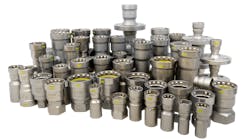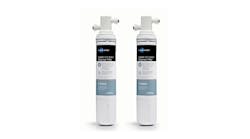Previous articles have detailed the upcoming manpower shortage in the construction industry and what is being done nationally to confront and combat the problem. Organizations such as National Construction Career Days Council and others, in conjunction with the local education infrastructure, are working diligently to engage prospective tradesmen and women on career paths in the construction industry. Will this effort be enough? What about present needs? How do we fill the ranks today?
One answer to those questions can be found by looking at what individual companies are doing to attract, train and retain skilled craftsmen.
Recently, I had the opportunity to talk with Ken Brown, director of workforce development for Tri-City Mechanical Corp. located in Chandler, Ariz. Tri-City is one of the largest, if not the largest, plumbing/mechanical/HVAC companies in Arizona. It employs some 512 people and runs a fleet of 168 vehicles. With qualified manpower at an absolute premium in the Southwest marketplace, I asked Ken how Tri-City approached the problem. The following is what he shared with me:
Originally an association of builders called the Arizona Builders Alliance developed a state-accredited training program of trade education that encompassed most phases of the construction industry. By the late 1990s, the ABA could not justify continuing its plumbing/mechanical program because of poor enrollment. Another local school, Gateway Community College, also had a course in the plumbing and mechanical trades, and this may have been why the ABA program suffered from low turnout. In this early iteration of the programs, there were a few starts and stops along the way, but the momentum was building.
The need for qualified employees had not gone away, but it was now very difficult to get any sort of consistent accredited training and educational program for the plumbing/pipefitting/HVAC trades. Without access to such programs, outside of union apprenticeship programs, companies like Tri-City went begging for qualified people.
In September 1999, Tri-City jumped into the breech by initiating its own apprentice training program. Using the same accredited curriculum that the ABA program had, Tri-City developed a four-year course for plumbing, pipefitting and sheet metal work, which results in the trainee obtaining a journeyman's license from the U.S. Department of Labor. On Dec. 11, 2002, Tri-City's program was granted full accreditation by the State of Arizona.
Alternately the Air Conditioning Contractors of America offers a certification program for HVAC service techs in joint effort with Arizona Public Service (the largest electrical energy supplier in the state).
Today the program at Tri-City boasts 50 students dispersed throughout the three core curricula, with staggered starts for plumbing, pipefitting and sheet metal courses. This allows new employees to be enrolled in the program at the beginning of each class as it starts. Exceptions are made for new hires with previous accredited education such as union apprenticeship training. Those students are blended into ongoing classes at whatever level is deemed appropriate.
Students attend a two and a half hour class twice a week for nine months each year. While attending the evening classes, the trainee works a full 40-hour week of on-the-job training.
Tri-City's initiative not only provides home-grown manpower, it also provides the opportunity for the students to become invested in the company. Many of Tri-City's management and supervisory personnel today are graduates of the company's program.
Before the inception of in-house training, the loss of manpower rate at Tri-City was 3.5 people per day! Now the rate is 0.3 per day, a testament to the success of the program. Today, Tri-City places a high priority on employee and manpower control. Instead of the usual labor loading when a new project begins and the subsequent layoffs when work slows down, the company projects manpower requirements and augments its own work force with selected, qualified tradesmen from a temporary manpower agency with whom they have a standing agreement. Also, layoffs are handled based upon performance in the field, not seniority, giving good workers incentive to maintain and improve their performance and skills.
With the education program in place and an assured manpower supply, Tri-City projects a steady 10% annual growth rate, despite current economic conditions. By making the long-term investment in the hiring, training and retaining of qualified people, the company has taken the proactive approach that the industry at large needs to take in order to blunt the impending shortage of qualified tradesmen and women in the coming decades. By engaging its employees on several levels, they have developed a framework by which they can accurately and confidently plan for a robust business today and in the future without the added worry of labor shortages and lack of qualified people.
It is true that most plumbing/HVAC companies are not as large as Tri-City Mechanical and do not have their resources. It is equally true, however, that by being innovative and taking a proactive approach to the manpower issue now, even a small shop can hire, train and keep good quality craftsmen that will add much to the success of that shop as well as adding to its bottom line.
Focusing on proper training and education is the key. Working with schools, educators and organizations must become a priority if we are to make a career in the trades something sought after instead of ignored. By approaching the industry as what it is, a long and proud tradition, as well as a source of commerce, even the smallest companies can make a huge difference in the future of tradecraft.
The Brooklyn, N.Y.-born author is a retired third generation master plumber. He founded Sunflower Plumbing & Heating in Shirley, N.Y., in 1975 and A Professional Commercial Plumbing Inc. in Phoenix in 1980. He holds residential, commercial, industrial and solar plumbing licenses and is certified in welding, clean rooms, polypropylene gas fusion and medical gas piping. He can be reached at [email protected].

